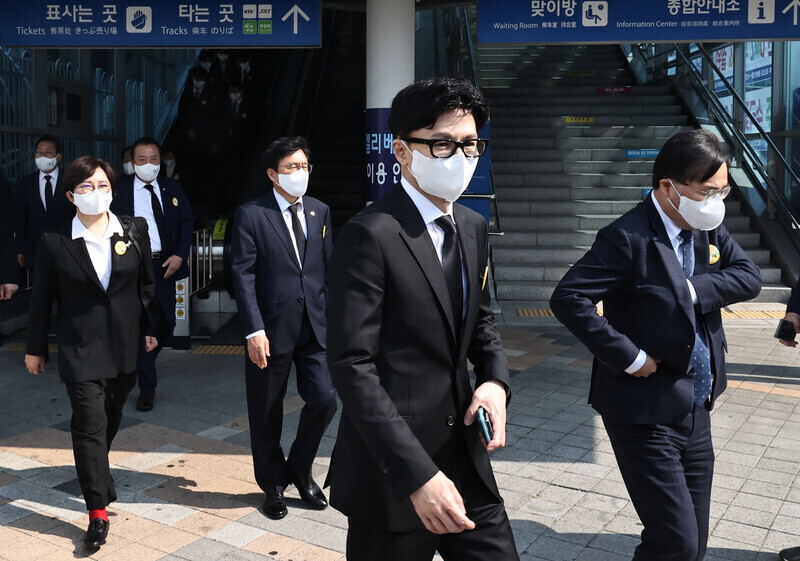hankyoreh
Links to other country sites 다른 나라 사이트 링크
[Editorial] Choice of Yoon loyalists for senior prosecutor positions threatens service’s neutrality

On Wednesday, just two days after taking office, South Korean Justice Minister Han Dong-hoon rushed through a reshuffle of high-level personnel at the Justice Ministry and the prosecution service.
As feared, Han placed prosecutors affiliated with Yoon Suk-yeol in key positions, including head of the Seoul Central District Prosecutors’ Office and director of the Justice Ministry’s Audit and Inspection Division. This is a classic case of appointing presidential loyalists while ignoring concerns raised both inside and outside the prosecution service. The Yoon administration doesn’t seem to have the slightest concern for the independence or political neutrality of the prosecution service.
As part of this reshuffle, Song Gyeong-ho, a prosecutor in the Suwon District Prosecutors’ Office, was named head of the Seoul Central District Prosecutors’ Office, the largest branch in the country and the one that handles most of the major political and social cases. In addition, Shin Ja-yong, head of the litigation division at the Seoul High Prosecutors’ Office, was appointed director of the Justice Ministry’s Audit and Inspection Division while Lee Won-seok, head of the Jeju District Prosecutors’ Office, was named deputy director of the Supreme Prosecutors’ Office. Lee will serve as acting prosecutor general while that position remains vacant.
Song Gyeong-ho is regarded as one of the key members of the Yoon faction. It was Song who managed the investigation into former Justice Minister Cho Kuk, under the direction of Han Dong-hoon himself. Shin Ja-yong is another close ally who worked with Yoon and Han on the team of special prosecutors who investigated Park Geun-hye’s influence-peddling scandal. Lee Won-seok is also on good terms with the president, following his tenure as director of the Planning and Coordination Department at the Supreme Prosecutors’ Office while Yoon was prosecutor general.
Simply put, Yoon has filled all the key positions at the Ministry of Justice and the prosecution service with prosecutors from the former office of special investigations, where they can work hand in glove with Han Dong-hoon.
Hence, South Korea’s justice system has been put under the direct control of the prosecution service, whereby a president who formerly worked as a prosecutor general has under his command his closest aide as his justice minister, who will, in turn, be overseeing his closest aides as they head key prosecutors’ offices.
The possibility that the justice minister will unofficially direct investigations as justice ministers of past administrations who had been prosecutors did, or that high-ranking prosecutors will deal with cases as the president would see fit, cannot be ruled out.
During his inaugural address on Tuesday, Han said, “The real prosecutorial reform that the public wants is the creation of a fair system that can strictly investigate even the socially powerful.” But it’s hard not to question whether investigations against “living and breathing power” would be possible under a justice system controlled by the prosecution.
It has also become difficult to expect the prosecution to live up to one of its most important values — political neutrality. It’s important for the prosecution service to establish its trustworthiness by demonstrating its neutrality and impartiality outwardly as well as in substance, but Han’s recent personnel decisions have practically broken any confidence in the institution of the prosecution.
During his time as prosecutor general, Yoon faced backlash even from within the service for openly treating preferentially his close connections among prosecutors specializing in special crimes. If prosecutors of a certain lineage enjoy favorable treatment when it comes to filling key positions, the disharmony and conflict it would cause within the prosecution would harm the well-being of the organization.
Using one’s authority over prosecutorial personnel appointments for the purpose of attending to one’s close connections or privatizing the prosecution would be an unacceptable abuse of power.
Please direct questions or comments to [english@hani.co.kr]

Editorial・opinion
![[Column] Tariffs on China: Trump was dumb, Biden dumber [Column] Tariffs on China: Trump was dumb, Biden dumber](https://flexible.img.hani.co.kr/flexible/normal/500/300/imgdb/original/2024/0520/191716191153918.jpg) [Column] Tariffs on China: Trump was dumb, Biden dumber
[Column] Tariffs on China: Trump was dumb, Biden dumber![[Column] What if Seoul took reunification by force off the table? [Column] What if Seoul took reunification by force off the table?](https://flexible.img.hani.co.kr/flexible/normal/500/300/imgdb/original/2024/0520/3017161928630494.jpg) [Column] What if Seoul took reunification by force off the table?
[Column] What if Seoul took reunification by force off the table?- [Editorial] Intensifying US-China rivalry means Seoul must address uncertainty with Beijing sooner than later
- [Column] When ‘fairness’ means hate and violence
- [Editorial] Yoon must stop abusing authority to shield himself from investigation
- [Column] US troop withdrawal from Korea could be the Acheson Line all over
- [Column] How to win back readers who’ve turned to YouTube for news
- [Column] Welcome to the president’s pity party
- [Editorial] Korea must respond firmly to Japan’s attempt to usurp Line
- [Editorial] Transfers of prosecutors investigating Korea’s first lady send chilling message
Most viewed articles
- 1To weigh costs and benefits, Korea must stop treating US troop presence as a sacred cow
- 2Kim Jong-un wanted to meet with residents of shelled Yeonpyeong Island in South, Moon recalls in mem
- 3Xi, Putin ‘oppose acts of military intimidation’ against N. Korea by US in joint statement
- 4New doc undoes stereotypes of N. Korea with candid portraits of women’s football legends
- 53 months into doctors strike, finding an emergency room in Korea is harder than ever
- 6Berlin mayor hints at tearing down ‘comfort women’ memorial in city
- 7Unification minister says trusting intent of N. Korea could lead to ‘miscalculation,’ criticizing Mo
- 8[Column] Tariffs on China: Trump was dumb, Biden dumber
- 9[Column] What if Seoul took reunification by force off the table?
- 1088% of Chinese firms would rather work with Korean partners than Japanese ones, survey finds